Create a Container Wildlife Habitat for Hummingbirds and Butterflies
http://decor-ideas.org 07/03/2015 20:13 Decor Ideas
The occasional glimpse of a hummingbird or butterfly stopping by for a drink is one of the many reasons people enjoy a garden in flower. But what if you have little or no room to plant a garden, let alone one that attracts butterflies or hummingbirds?
Even if your garden space is limited to a balcony, a patio or simply a windowsill, you can use containers to create a mini habitat filled with nectar-producing plants that are sure to attract your favorite flying visitors. You’ll also be decorating your outdoor space with the color and beauty of flowering plants.
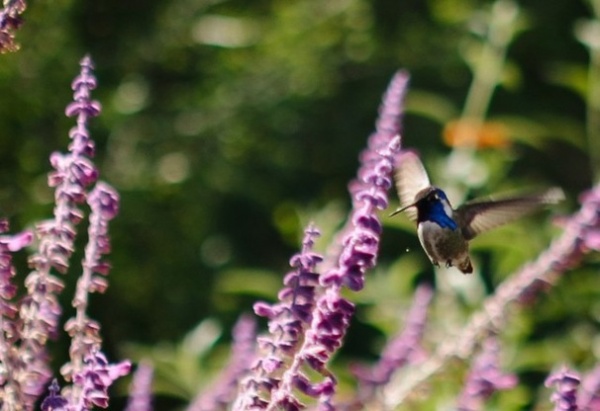
The whirring of hummingbirds’ wings and the sight of their brilliantly colored throat as they hover around flowers is pure delight for those lucky enough to see them. Attracting hummingbirds to the areas surrounding your home (or office), where you can see them close up, is easily done by adding flowering plants that draw them in with the promise of sweet nectar.
Here, a Costa’s hummingbird flies around the purple flower spikes of Mexican bush sage (Salvia leucantha, USDA zones 8 to 10; find your zone) at the Desert Botanical Garden in Phoenix. Let’s get started on creating your own container habitat.
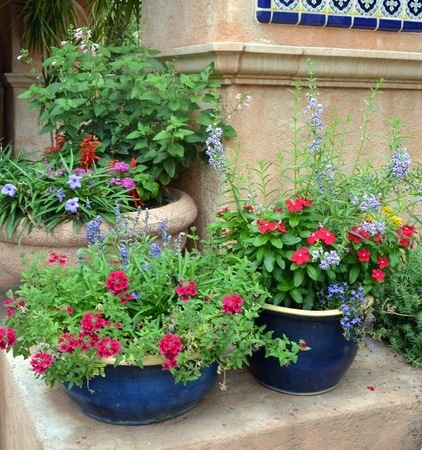
Location
One of the primary goals of creating a container wildlife habitat is to be able to view your flying visitors. Choose a location near an entry, a window, a pathway or anywhere you will be likely to catch a glimpse. Most flowering plants do best in the sun, so try to choose a location that receives at least six hours of sunlight.
Although you can attract hummingbirds or butterflies with a single container, grouped containers make a better target — the more flowers, the more likely passing butterflies and hummingbirds will spot them. Here, a group of containers filled with Katie ruellia (Ruellia brittoniana ‘Katie’, zones 8 to 10), red salvia (Salvia splendens, zones 10 to 11), Victoria Blue salvia (Salvia farinacea ‘Victoria Blue’, zones 8 to 10) and red verbena (Glandularia spp) beckon flying visitors.
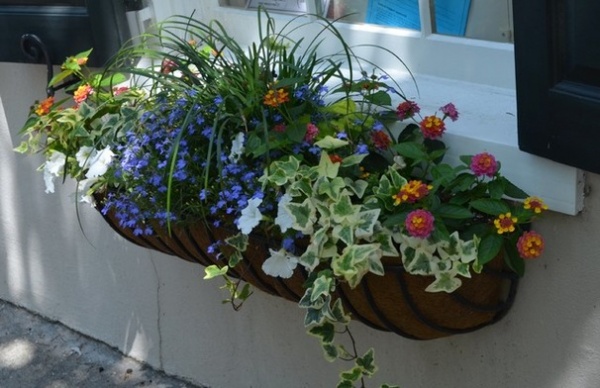
Don’t have room for a container? Look up. Window boxes and hanging baskets are great options. This window box on a historic street in Charleston, South Carolina, is planted with Radiation bush lantana (Lantana camara ‘Radiation’, zones 9 to 11), blue lobelia (Lobelia sp), white petunias (Petunia sp) and trailing ivy.
See how to build your own window planter box
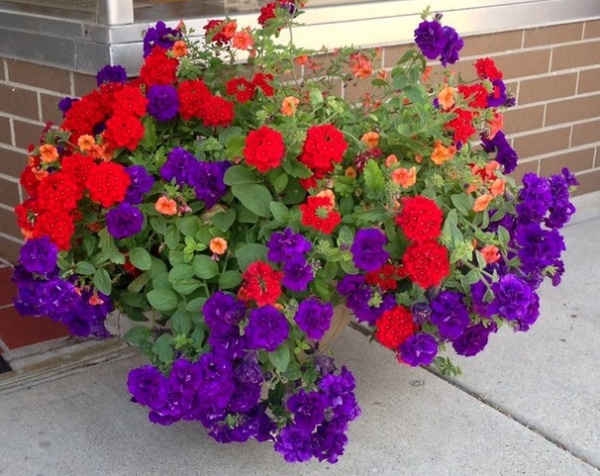
Attracting hummingbirds and butterflies doesn’t have to be limited to your home garden. Consider planting containers filled with nectar-rich flowering plants outside your office.
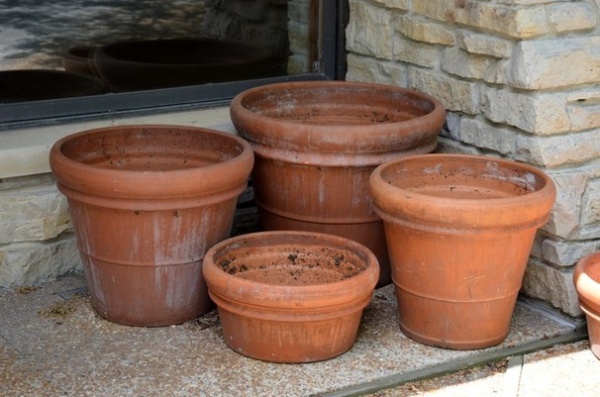
Containers and Soil
Larger containers work best, because they have a larger capacity for soil and plants. Also, the soil will be slower to dry out and less susceptible to temperature extremes.
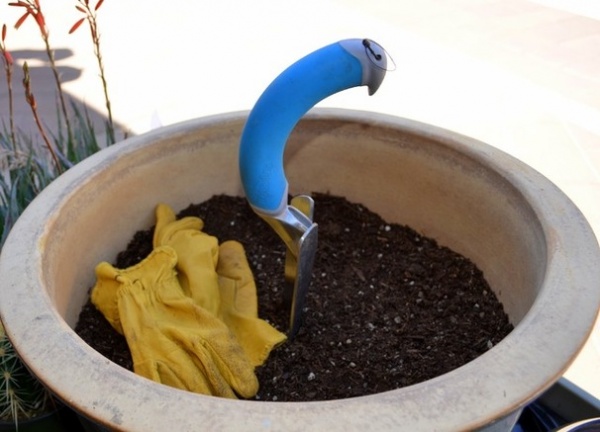
Use a high-quality planting mix specially formulated for use in containers. It holds on to just the right amount of moisture, as opposed to potting soil, which can become soggy.
Learn more about how to get the best soil for your containers
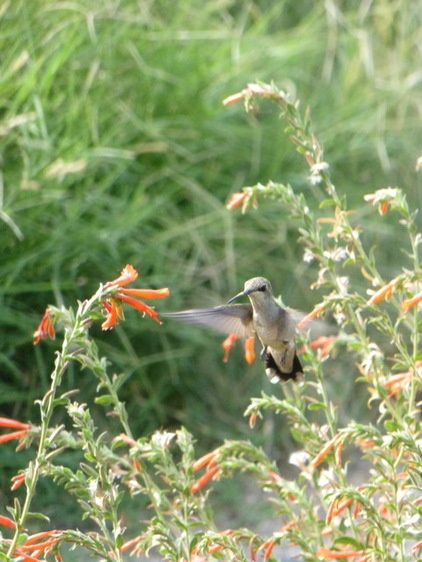
Plants
Native plants make a great choice for container wildlife habitats, because they are uniquely suited to attract the local species of butterflies and hummingbirds. In addition, they are low maintenance, because they are adapted to the local climate.
Your local cooperative extension office or the Lady Bird Johnson Wildflower Center can help you find the best native species for your area that will attract butterflies and hummingbirds.
Shown: California fuchsia
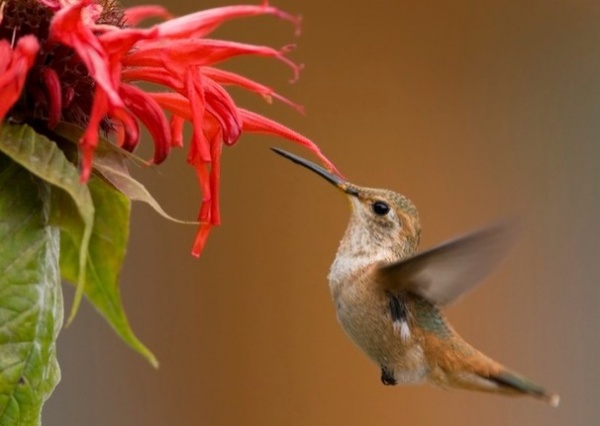
Plants to attract hummingbirds. Color and shape play an important part in attracting hummingbirds. Tubular flowers are ideally suited for hummingbirds and their long beaks. Red is their favorite flower color, but they feed from flowers of all colors, from the red-orange flowers of firecracker penstemon (Penstemon eatonii, zones 5 to 9) to the yellow flowers of aloe vera (Aloe vera, zone 9).
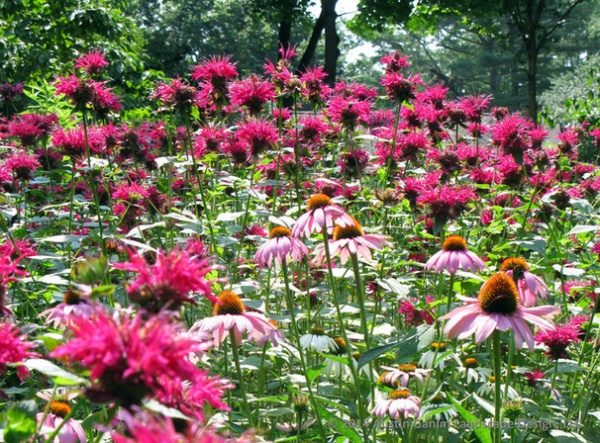
Many flowering plants, including shrubs, perennials and annuals, attract hummingbirds. Here are a few favorites suitable for growing in containers:
Aloe (Aloe spp)Beebalm (Monarda spp)Dianthus (Dianthus spp)Daylily (Hemerocallis spp)Foxglove (Digitalis spp)Mexican honeysuckle (Justicia spicigera, zones 9 to 11)Lantana (Lantana spp)Penstemon (Penstemon spp)Petunia (Petunia spp)Salvia (Salvia spp)Summer phloxIncorporating moss and lichen into your wildlife container is another way to attract hummingbirds; they use those materials to build their nests.More flowers hummingbirds adore
Shown: Purple coneflower (Echinacea purpurea, zones 3 to 9) and beebalm (Monarda sp)
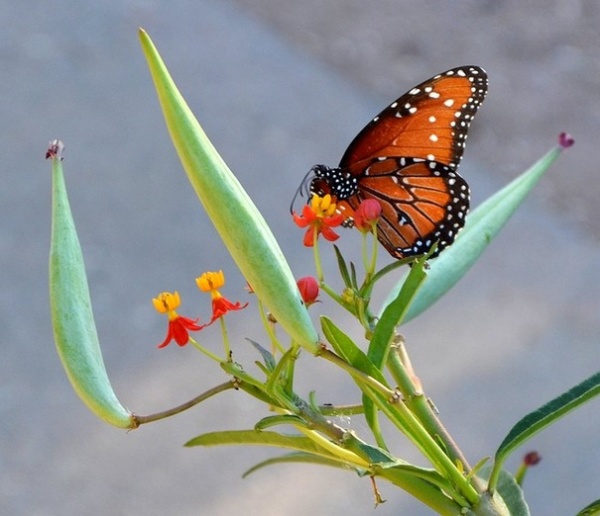
Plants to attract butterflies. Butterflies, like hummingbirds, are attracted to colorful, nectar-rich plants. In fact, the more colorful plants massed together, the better. They prefer open-faced plants to land on, since they do not hover to feed, as hummingbirds do.
Shown: A queen butterfly (Danaus gilippus) feeding on butterfly milkweed (Asclepias tuberosa, zones 3 to 10)
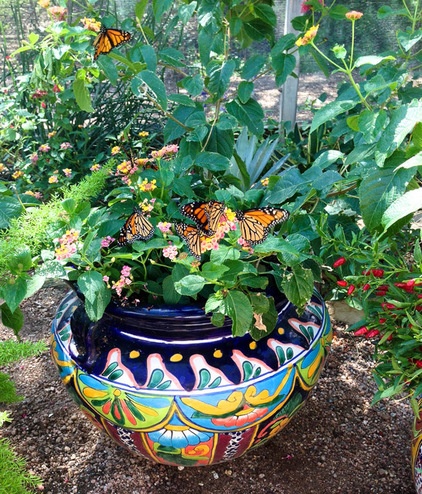
Flowering plants that attract butterflies and are perfect for a container garden include:
Alyssum (Lobularia maritima, all zones)Aster (Symphyotrichum spp, Aster spp)Beebalm (Monarda spp)Daylily (Hemerocallis spp)Lantana (Lantana spp)Lavender (Lavendula spp)Milkweed (Asclepias spp)Purple coneflower (Echinacea purpurea)Salvia (Salvia spp)Verbena (Verbena spp)More plants that attract butterflies and birds
Shown: Monarch butterflies flock around a container planted with Confetti bush lantana (Lantana camara ‘Confetti’, zones 9 to 11)
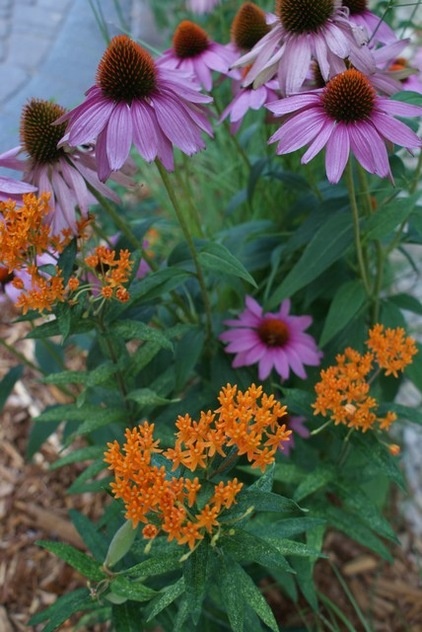
How to arrange plants. While butterflies and hummingbirds aren’t particularly picky about how plants are arranged, it’s best from a design perspective to plant the taller plants in the center of the pot or toward the back of the container. Surround taller plants with medium-sized plants and finish with trailing plants around the outer areas.
Container habitat gardens can be quite versatile, and the possibilities are endless: a container filled with annuals, a mixture of perennials, a single flowering shrub or any combination. When setting out to attract hummingbirds, it is important to remember that the more color there is, the more likely you will be to attract butterflies and hummingbirds.
Learn the secret formula to grouping plants in a container
Shown: Purple coneflower and butterfly milkweed
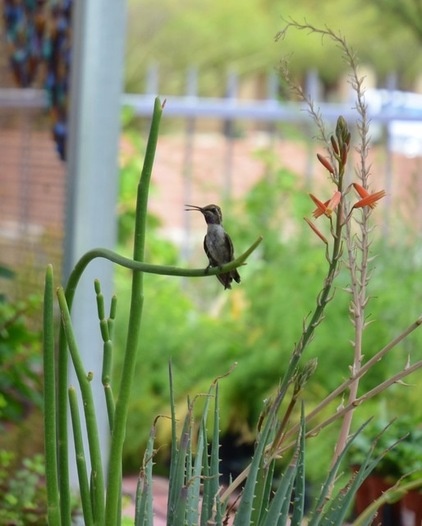
Additional Elements
To make your garden even more attractive to hummingbirds, make sure there are places for them to perch, such as a nearby tree. You can also provide convenient perching spots in the container; add certain succulent plants, add some garden art that rises a foot or so above the container, or simply insert a small dead tree branch with multiple places for perching.
Shown: A black-chinned hummingbird perched on a slipper plant (Pedilanthus macrocarpus, zones 9 to 10) in Tucson, Arizona
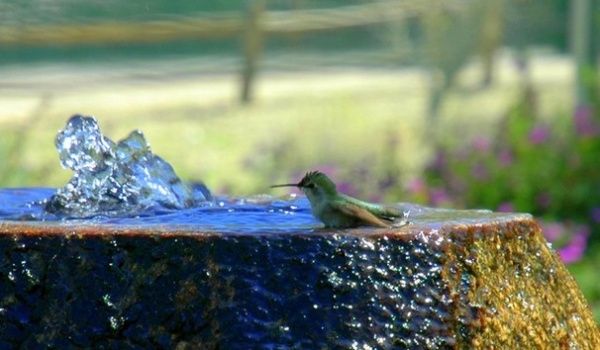
Both butterflies and hummingbirds are drawn to water, so selecting a place for containers that is near a water source, like the one seen here, is a bonus.
Shown: An Anna’s hummingbird enjoying a bath at The Living Desert Zoo & Gardens in Palm Desert, California
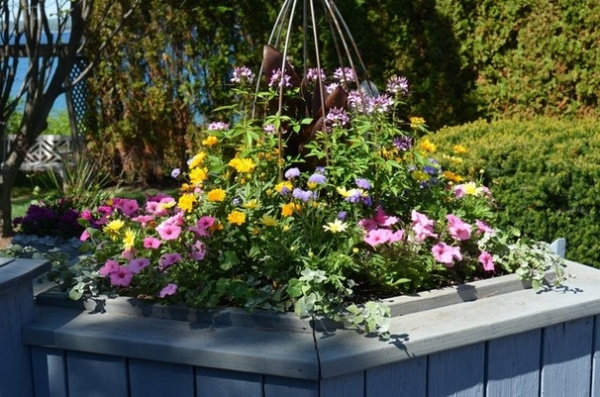
This container is filled with nectar-rich coreopsis, petunias and trailing ivy.
See more ways to attract birds and butterflies
Related Articles Recommended












